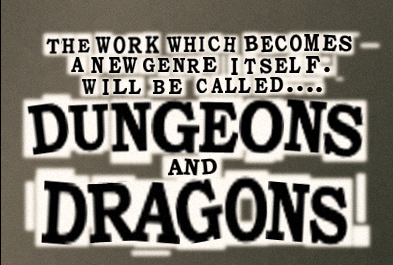A New Genre Itself
 An overriding concern of this blog since its start are the literary precursors of Dungeons & Dragons. Believe it or not, this has often been a somewhat contentious subject, since there's plenty of conflicting evidence on the matter, not to mention a fair bit of obfuscation from the various parties involved. The subsequent history of both D&D and fantasy roleplaying games more generally, including their explosive, faddish popularity in the late '70s and early '80s, has only further muddied the waters, as other creators added their own ingredients to the imaginative chaos that Arneson and Gygax first unleashed upon the world nearly half a century ago.
An overriding concern of this blog since its start are the literary precursors of Dungeons & Dragons. Believe it or not, this has often been a somewhat contentious subject, since there's plenty of conflicting evidence on the matter, not to mention a fair bit of obfuscation from the various parties involved. The subsequent history of both D&D and fantasy roleplaying games more generally, including their explosive, faddish popularity in the late '70s and early '80s, has only further muddied the waters, as other creators added their own ingredients to the imaginative chaos that Arneson and Gygax first unleashed upon the world nearly half a century ago.Even bearing these facts in mind, there can be little doubt, I think, that Gary Gygax at least took his primary inspiration from just a handful of older writers – L. Sprague de Camp, Robert E. Howard, Fritz Leiber, H.P. Lovecraft, Abraham Merritt, Fletcher Pratt, and Jack Vance – and that his conception of the game reflects this. Despite the much-vexed question of Tolkien's influence on the game, I don't think anyone can honestly deny that Gygaxian D&D owes more to what I call "pulp fantasy" than to anything more highfalutin. One need only look at Gygax's various reading lists, culminating in Appendix N of the AD&D Dungeon Masters Guide, to see this.
And yet I'm not sure that matters.
The moment Dungeons & Dragons was released into the wild – or Pandora's Box was opened, to use Greg Stafford's perfect metaphor – it was no longer the possession of any single person, including its creators. This is something Gygax himself recognized early on, even if he had his own ideas about the kind of fantasy roleplaying adventures he most enjoyed. By all accounts, the early days of the hobby were ones of wild, reckless invention, as everyone who got their hands on D&D made it their own. To some extent, this was by necessity, as the original 1974 rules were vague and unclear about just how to interpret them. It was thus an inevitability that a wide variety of mutant strains of Dungeons & Dragons would soon proliferate across the world.
At the same time, many of the game's early adopters liked the idea of D&D, but they took exception to this or that element of it. The changes they introduced to it were made, not out of ignorance of how Arneson and Gygax intended the game to played – assuming there even is such a thing in the first place – but intentionally, in order to bring the game more in line with the kind of fantasy adventures they most enjoyed. Of course, in the process of doing so, they became their own unique games – Tunnels & Trolls, Empire of the Petal Throne, RuneQuest, etc. – which, in turn, spawned their own "mutants," creating an entirely new ecosystem of creativity that continues to this day.
What's most interesting to me right now is that even as Gary Gygax was still in charge of the development of Dungeons & Dragons, or at least AD&D, there was plenty of variation in its presentation and content. Compare the work of David Cook, Lenard Lakofka, Lawrence Schick, and Allen Hammack to that of Gygax – or to each other. Each brings a different perspective and draws on different inspirations to present Dungeons & Dragons as he understands it (and, presumably, prefers it). What's remarkable is that, rather than undermining the game, this approach expands its reach. D&D, even as published by TSR, is a house of many mansions.
This probably explains why D&D was and continues to be the most popular and widely played RPG of all time. Being the first out the door no doubt helped, but I think it's more than that. D&D has always been a loose, reasonably flexible framework to which one can add (or subtract) whatever one requires for one's preferred style of fantasy adventures. Gygax unquestionably had his own preferences, but so too did everyone who's ever written for or played the game over the last fifty years. There is no reason that your D&D and my D&D should be the same, or even similar. Indeed, I remember a time when it was commonplace to assume every campaign was as unique as its players and referee, which is as it should be, in my opinion.
Dungeons & Dragons is a very strange game. It's one whose play can vary considerably from place to place, yet which is nevertheless completely recognizable to anyone who's even passingly familiar with the form of that play. I won't go so far as to say that no other RPG is similar in this regard, but D&D exemplifies this to a much greater extent than any other roleplaying game of which I can think. It's one of the most amazing things about D&D and I don't think it gets enough credit for it.
James Maliszewski's Blog
- James Maliszewski's profile
- 3 followers



